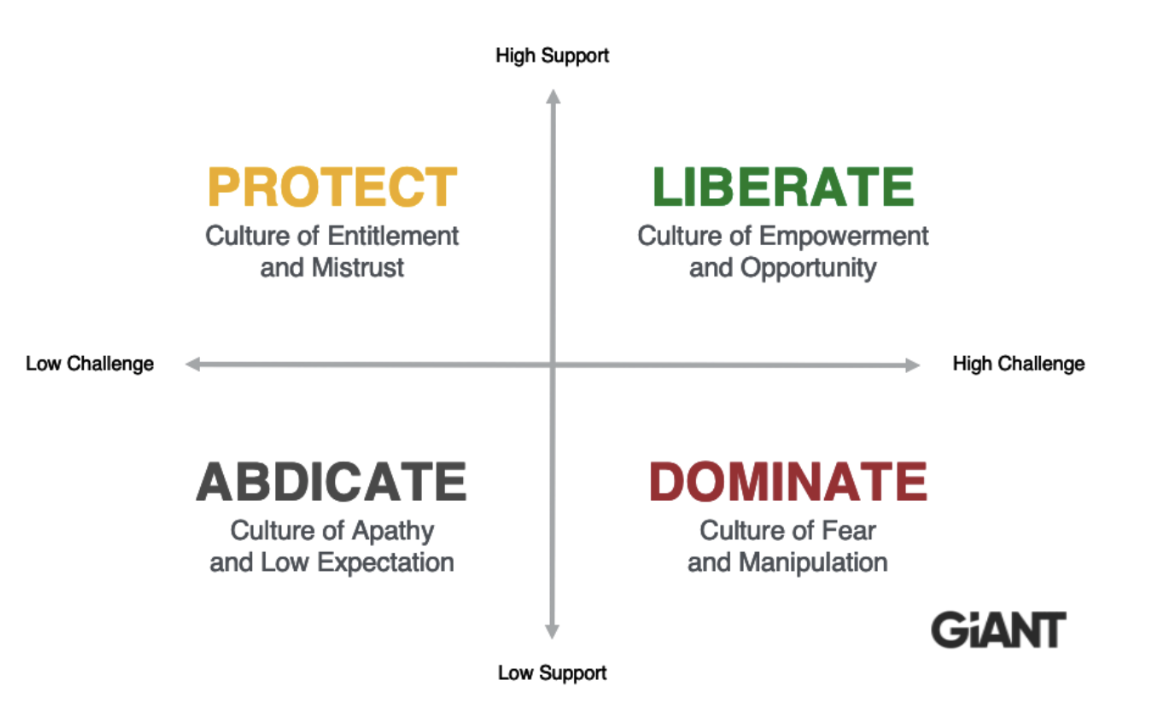Authored by Executive Director and previous Society President Dr. Brandon Jennings, PharmD, BCACP
Have you found your Leadership Voice yet? Take the free GiANT 5 Voices assessment with Phi Lambda Sigma here.
Why is leadership so difficult? Why can’t we just say “keep up the good work” and all be fine? Because leadership is nuanced. It requires a dedication to compassion and empathy, while also maintaining high standards of work and inspiration for growth.
As a leader, we need to constantly be thinking about how to liberate those we lead. Our definition of liberation is combining the right amount of support with the right amount of challenge for the specific individual on the other side of you. How do we determine this? This is where things get tricky because it is often by trial and error. As humans, we don’t walk around with our ideal “liberation ratio” written on our foreheads for our peers to see. Instead, the leader has to lean on their emotional intelligence (what others need from me?) and their self-awareness (what do I need to be successful?) in hopes of determining the correct support-challenge ratio.
Our definition of liberation is combining the right amount of support with the right amount of challenge for the specific individual on the other side of you. How do we determine this?

So, this begs the question- how can this process be more efficient and how can leaders become more adept at identifying how to liberate a teammate. There are a few hints based on your dominant personality types. Using the GiANT framework, the feelings-oriented voices are the nurturers and connectors and the logic-oriented voices are guardians and pioneers. The creative voice will often appear feelings-oriented to those around them but remain very logic-oriented as they attempt to solve challenges that they are facing.
For those voices that are more feelings-oriented, you will often find yourself in the ‘protect’ quadrant (see above). Your tendency will be to provide support but shy away from challenge. However, when very little challenge is expected, one feels comfortable and entitled to continue on their current path. They look to their leader to protect and cover for them, and celebrate their wins, rather than eliciting critical feedback from their superiors to aid in their personal growth. In order to liberate those around you, it is imperative that the protector face the challenge in front of them and extend that to those they are leading in order to help that teammate succeed. This often requires preparation, commitment and the ability to withstand what might feel like uncomfortable conversations with a teammate to ultimately help them succeed.
On the other hand, for those that are more logic-oriented, you will often land in the ‘dominate’ quadrant. In this situation, bringing challenge is not the concern, but instead there may be a lack of support for those they are leading. The dominator is often waiting for the teammate to ask questions and request support. The difficulty here is that oftentimes the teammate does not feel safe to ask the dominator questions and instead default to guessing what is needed rather than ask for help or clarification. This can develop into a culture of fear which prevents the team from reaching their full potential. In order for the dominator to liberate those on their team, they must make a conscious effort to provide support and embrace conversations that might seem unfamiliar to them, often centered around feelings-oriented questions.
So, why is leadership difficult? Because, it requires the leader to be both self-aware (what quadrant am I in right now?) and emotionally intelligent (what does the person on the other side of me need at this point in time – support or challenge?). Considering the Support-Challenge Matrix when leading your team is an invaluable tool, imperative to long-term success.
The PLS Pill is a publication offering for the Phi Lambda Sigma membership to share thought leadership on any topics regarding pharmacy practice or leadership.
To publish in the PLS Pill, please email haley@philambdasigma.org.








